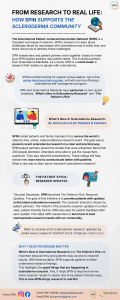
Upcoming events
Next Support Group Meeting
Our next Scleroderma Manitoba Support Group meeting will be an In Person meeting, taking place on Saturday, April 25th at 1 p.m. at the St. Boniface Library.
The topic is “Nutrition and the Autoimmune Diet”.
More details will follow.
The Bulletin

The Fall/Winter 2025 Bulletin has arrived!
Download or read this edition of The Bulletin here for the latest in news and information about living with scleroderma.
Visit The Bulletin page for past editions.
New Infographic from SPIN
 From Research to Real Life: How SPIN Supports the Scleroderma Community.
From Research to Real Life: How SPIN Supports the Scleroderma Community.
“The Scleroderma Patient-centered Intervention Network (SPIN) is a Canadian-led research network. SPIN’s mission is to learn about challenges faced by real people with scleroderma and to build, test, and share resources to address these challenges.
SPIN researchers and patient partners work together closely to make sure SPIN studies address real patient needs.
This includes partners from Scleroderma Manitoba. As a result, SPIN is a world leader in research that matters to people with scleroderma.
SPIN and Scleroderma Manitoba have partnered on two recent initiatives, What’s New in Scleroderma Research and The Patient’s Pick.”
View or download this informational resource here.
Consider getting involved!
Participating as a Director on the Scleroderma Manitoba Board is a great way to meet others in the community, learn more about scleroderma and help to continue to provide support to the scleroderma community in Manitoba to make it even stronger.

We are seeking volunteers to fill the vacant board positions of Vice President and Member at large–Fundraising.
Interested? Have questions? Email sclerodermamb@gmail.com.
2025 Education Event and AGM videos available
Visit the Videos page to view the recordings of the AGM proceedings and presentations by Dr. Shane Cameron: Understanding Current & Upcoming Treatments for Scleroderma, and Dr. Anastasiya Muntyanu: Systemic Sclerosis: Pathogenesis, Diagnosis, & Management.
Reports from the AGM will be available soon.
A video from ScleroCare
ScleroCare is an online app that was designed for Canadian scleroderma patients. Users are able to find community, support, and individualized answers.
It connects patients with local resources, hosting forums, personal messaging systems, and educational material. Patients are also encouraged to use their medical résumé tool, to help with medical visits. ScleroCare regularly updates their site.
Please take the time to watch this walk through video on how to use the ScleroCare app:
About ScleroCare
ScleroCare “started as a student project, driven by passion and a commitment to improving care for those with scleroderma. With support from the Scleroderma Society of Ontario, it evolved into a platform offering tailored resources and community support.”
“At ScleroCare, we’re devoted to empowering those with scleroderma by fostering connections, and providing accessible, community-driven resources for support.”
Resources to check out
Research webinar
A message from the University of Cambridge Long-term Conditions Research Group:
 Thank you to everyone who … attended the Long-Term Conditions Group’s research webinar last month.
Thank you to everyone who … attended the Long-Term Conditions Group’s research webinar last month.
This webinar covered findings from our studies exploring patients’ diagnostic journeys, patient-clinician communication, the impact of autoimmune diseases on patient lives, patient experiences of adapting to life with their disease, mental health, inequalities in care and menopause.
I am happy to share the recording of this webinar.
Free prescription savings card
The innoviCares card is a free prescription savings card available to all Canadian residents, and is funded by participating pharmaceutical manufacturers.
Videos available
There are several videos available on topics related to living with scleroderma on our Videos page.
 Participate in SPIN-SELF
Participate in SPIN-SELF
Enrollment is now open for SPIN’s scleroderma self-management program. SPIN-SELF is a program designed to provide knowledge and skills for managing physical, emotional and social consequenses of scleroderma.
Participants get access to 9 self-management modules and receive $100.
| Visit the SPIN website to learn more. |
Fiches éducatives maintenant disponibles en français | Educational sheets now also available in French
Nous continuons d’ajouter de nouvelles fiches d’information sur la vie avec la sclérodermie, et Sclérodermie Québec nous a fourni aussi des versions françaises.
Accédez aux versions françaises ici.
We continue to add new information sheets related to living with scleroderma, and now Scleroderma Quebec has provided us with French versions as well.
Access the English versions here.
SclerodermaNews.com
Scleroderma News is “The Web’s Daily Resource for Scleroderma News.”
It’s a good site to bookmark for the latest in research and information about scleroderma.
Scleroderma Manitoba’s Support Group is there for you.
Scleroderma Manitoba hosts support groups for scleroderma patients, their families, and their supporters.
Upcoming meeting dates and details as well as summaries and resources from past meetings are available here.
Welcome to Scleroderma Manitoba
Whether you are newly diagnosed or have been living with scleroderma for some time, or if your spouse or partner, child, parent, or family member has been diagnosed with scleroderma, or if your friend, co-worker, or employee has scleroderma, YOU are a part of the scleroderma community in Manitoba.
This site is here to help you find support and to learn more about scleroderma, current research, advocacy and ways to volunteer.
Information about COVID-19 vaccination for scleroderma patients.
About Scleroderma Manitoba
Read more about Scleroderma Manitoba and its Mission here.
Research
Find the latest information on scleroderma research here.
Get involved
Check out volunteer opportunities and ways to donate.
What is Scleroderma?
Scleroderma (systemic sclerosis or SSc) is a largely misunderstood chronic disease affecting about approximately 22,000 Canadian and five to six times more women than men are affected by this disease.
Scleroderma is an autoimmune disease, a condition in which a person’s immune system turns against itself by producing antibodies that attack its own tissues (i.e. autoantibodies).
The word “scleroderma” is derived from the Greek words “skleros” (hard) and “derma” (skin) and is characterized by progressive skin hardening.
Scleroderma is characterized by an overproduction of collagen and damage to the blood vessels that causes excessive scarring within the various organs. This imbalance leads to a hardening of the skin (fibrosis) and an alteration of the affected organs.
Moreover, in most cases scleroderma limits the motor skills and dexterity of those affected and causes great physical and psychological suffering since it produces disfiguring appearance-related changes. Learn more.








